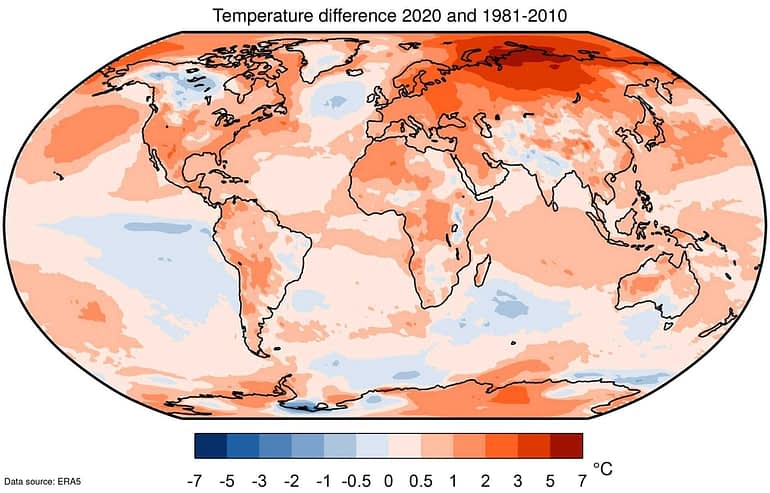2020 Tied for Hottest Year on Record, Capping Off the World’s Warmest Decade
The Copernicus Climate Change Service reported that 2020 tied for the hottest year on record, with global temperatures 0.6 ºC warmer than the standard reference point and 1.25 ºC above pre-industrial levels, making it the end of the warmest decade ever recorded. The data also showed that the Arctic and parts of northern Siberia experienced temperatures between 3 ºC and 6 ºC above the reference point, with 2020 being the hottest year ever recorded in Europe and the Northern Hemisphere experiencing its hottest-ever temperatures throughout the year.
Average global temperatures in 2020 were tied for the hottest on record, marking the end of what has also been the warmest decade (2011 to 2020) ever recorded.
According to data published by the Copernicus Climate Change Service, 2020 was 0.6 ºC warmer than the standard 1981 to 2010 reference point and 1.25 ºC above pre-industrial levels.
It is no surprise that the last decade was the warmest on record, and is yet another reminder of the urgency of ambitious emissions reductions to prevent adverse climate impacts in the future.
The data from the European Union-sanctioned entity also show that the previous six years have been the warmest six on record, with 2020 and 2016 both having been the hottest.

Among the areas most affected was the Arctic and parts of northern Siberia, which recorded annual average temperatures between 3 ºC and 6 ºC above the 1981 to 2010 reference, including the hottest temperature ever recorded above the Arctic Circle – 38 ºC.
See Also:Climate Change News2020 also proved to be the hottest year ever recorded in Europe. The continent responsible for roughly 70 percent of the world’s olive oil production experienced its hottest winter, with temperatures exceeding the previous record set in 2016 by about 1.4 ºC.
In general, the Northern Hemisphere (with the exception of a region of the center of the North Atlantic Ocean) experienced its hottest-ever temperatures throughout the entire year.
Meanwhile, the Southern Hemisphere experienced slightly below average temperatures, partially as a result of the cooling influence of La Niña.
“2020 stands out for its exceptional warmth in the Arctic and a record number of tropical storms in the North Atlantic,” Carlo Buontempo, the director of the Copernicus Climate Change Service, said.
See Also:Challenges Await Growers As Mediterranean Basin Becomes Hotter and Drier“It is no surprise that the last decade was the warmest on record, and is yet another reminder of the urgency of ambitious emissions reductions to prevent adverse climate impacts in the future,” he added.
The organization is set to release a full and more detailed analysis of its latest findings ahead of the annual E.U. climate summit in April.









